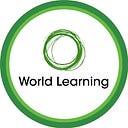An Innovative Approach to International Education in Algeria
Co-sponsored by the U.S. Department of State and the U.S. Department of Education, International Education Week is an opportunity to explore and showcase the benefits of international education and exchange in the U.S. and abroad. World Learning is celebrating all week long with stories about how international education has made a difference for our program participants from 162 countries worldwide. Today, we are highlighting the importance of STEM and innovation in international education.
On any given day, you might hear the buzz of drones or see robots crashing into walls at World Learning’s STEAM Center in Algiers, Algeria.
In April 2016, World Learning opened the center focused on science, technology, engineering, arts and mathematics (STEAM) with support from the U.S. Embassy in Algeria, the Anadarko Algeria Company, Dow Chemicals, and Boeing Aeronautics. Here, grade school children from across the capital city come to learn all kinds of STEAM skills such as coding, programming, design thinking, virtual reality, and robotics.
“When I was a teenager it was a big deal if you could do the Rubik’s Cube,” says World Learning Algeria Country Representative Leah Bitat. “Now you’re building a robot that can do the Rubik’s Cube.”
Last year, the Algiers STEAM Center sent Algeria’s first team of competitors to the FIRST Global Challenge, an international robotics competition that’s often likened to the Olympics of robotics. For the competition, the students learned how to build a robot that could collect and sort plastic balls as it moved across a playing field. They then had to work together to operate the robot in real time as they competed with teams from other countries to pick up the most balls.
Competitions like these are among the international exchanges that World Learning is celebrating this week for International Education Week. A joint initiative between the U.S. Department of State and the U.S. Department of Education, International Education Week explores the benefits of international education and exchange worldwide.
In Algeria, those benefits are clear.
For members of the robotics team, that international exchange was eye-opening.
“The opportunity to participate in that [competition] just explodes their minds with possibilities, different ways of working,” Bitat says. “They’re competing with other countries, so they learn a lot about different ways of thinking, different ways of working together, different ways of collaborating. And then that really feeds their continuing experience once they get back here.”
Participating in the robotics competition also strengthened the STEAM Center. When they returned to Algeria, the 2017 team members shared their observations and experiences from the competition. For example, they saw the importance of having a collaborative spirit: the teams that could come together under pressure performed well while those that did not collaborate often fell apart. The team also helped advise the 2018 robotics team, which won second place for the competition’s award for teams that documented their experience on social media.
“It was a great thing,” Bitat says. “Not just for robotics, but that whole process of designing something as a team, troubleshooting it, and working things out together in a collaborative way.”
International education and exchange opportunities also benefit Algeria more broadly. Bitat notes that the country can often feel disconnected from the rest of the world, as it’s difficult for Algerians to obtain a visa to get in or out. International exchanges and study abroad opportunities help bridge that disconnect. When Algerian students travel abroad—whether to the U.S., Turkey, or Bulgaria—they come back with knowledge that makes them better prepared for the workforce.
World Learning’s STEAM Center prepares students for those opportunities. By participating in hands-on activities—and discovering how science works in real-world applications—students gain the skills they need to earn scholarships and other opportunities at universities in Algeria and abroad, where they can further develop their STEAM knowledge.
“They start to become the darlings of the international exchange programs here,” Bitat says.
The STEAM program also builds confidence among students who may not have thought they could earn such opportunities.
“It’s really accessible to a lot of people,” she adds. “You don’t have to be this super-accomplished whiz kid, great at school and computing and formulas and all that. The practical approach really unlocks it for kids who didn’t think that they were the robotics type. We deeply believe that science can be unlocked for anybody.”
In fact, it has been so successful that World Learning recently opened a second STEAM center in Ouargla, a city in the southern Sahara. These two STEAM centers serve as hubs for seven “STEAM corners”—smaller STEAM initiatives run by former STEAM center volunteers throughout Algeria. In the future, World Learning hopes to establish even more STEAM centers and corners in that hub-and-spoke model.
“It really works beyond our expectations,” Bitat says.
